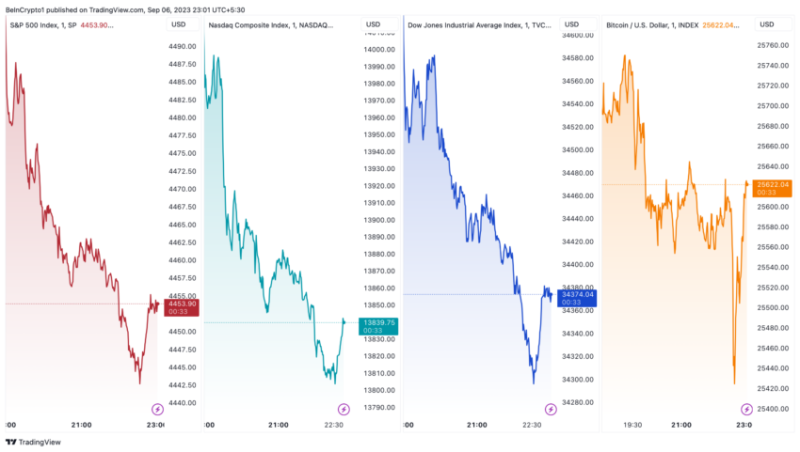
As this news reverberated across Wall Street, major US stock indices like the Dow Jones, S&P 500, and Nasdaq dipped. The ripples did not spare the crypto market, as Bitcoin also experienced a slight decline.
A Wary Eye on Inflation
Collins emphasized the need for the central bank to proceed cautiously, stating that further tightening could be warranted.
“Overall, we are well positioned to proceed cautiously in this uncertain economic environment, recognizing the risks while remaining resolute and data-dependent, with the flexibility to adjust as conditions warrant…. Further tightening could be warranted,” said Collins.
This cautiousness comes from inflation concerns that have also impacted other economic areas. For instance, soaring global oil prices have analysts predicting that inflation could remain elevated for longer.
As the Federal Reserve prepares to release its beige book survey of business and economic conditions, traders and investors alike are keeping a wary eye on any data that could offer clues on the future of interest rates.
“Patience will give us time to better separate ‘signal’ from ‘noise’ as we assess available data; and to balance risks, as the effects of tighter policy continue to work through the economy,” added Collins.
Despite the Federal Reserve’s caution, recent US services sector data from the Institute for Supply Management (ISM) suggested that inflation pressures persist, which may warrant keeping interest rates elevated.
“There has been an increase in the rate of growth for the services sector, reflected by increases in all four of the subindexes that directly factor into the composite Services PMI and faster supplier deliveries. Sentiment among Business Survey Committee respondents varies by industry; however, the majority of panelists are positive about business and economic conditions,” said Anthony Nieves, Chairman of the IMS.
Meanwhile, manufacturing activity in global economies like Germany, Britain, and the eurozone declined. These mixed signals present a complex backdrop for decision-making at the Fed’s next policy meeting.
Cryptos, Stocks React
In the stock market, the technology sector led the decline. For instance, the S&P 500, an index often considered the best indicator of US equities, faced a downturn, opening at 4,484.81 and falling by 0.27%. With technology stocks making up a substantial portion of this index, the S&P 500 is highly sensitive to shifts in interest rates.
Likewise, the Nasdaq Composite, an index heavily weighted toward technology companies, opened at 13,977.26 but dropped 0.31%. Tech companies, often reliant on the availability of cheap capital for growth and research and development, are generally more susceptible to rate hikes.
Therefore, a potential interest rate increase could slow innovation and create hurdles for start-ups and established giants.
The Dow Jones Industrial Average started the day at 34,565.04 but fell by 0.22%, shedding 76.93 points. This index, long a standard measure of the health of US industrial stocks, also faces headwinds from looming rate hikes. Established blue-chip companies in the Dow could see their borrowing costs increase, affecting expansion plans and dividend payouts.
Notably, Bitcoin inched lower by 1.50% to $25,399, perhaps a subtle nod to investors’ uncertainty in an unpredictable economic environment.

S&P 500, Nasdaq Composite, Dow Jones, Bitcoin Performance. Source: TradingView
Amid this environment, investors are weighing multiple factors. Some, like Jeremy Grantham, have sounded the alarm about the potential recession and a looming debt crisis.
“AI is very important. But it’s perhaps too little, too late to save us from a recession. The deflationary forces from the tech stocks breaking in 2021 — probably too big. The power of interest rates rising and depressing the real estate market — very negative, slow-moving influence. I suspect that they will once again dominate, and we will have a recession running perhaps deep into next year, and an accompanying decline in stock prices,” Grantham said.
Others remain optimistic, pointing to strong services sector performance as a sign of resilience in the US economy.
As the Federal Reserve keeps its cards close to its chest, markets are in a state of alertness, contemplating the broader economic implications of potential rate hikes.
The ball is in the Federal Reserve’s court, and the financial market is watching intently, ready to adjust strategies based on forthcoming data and decisions.

